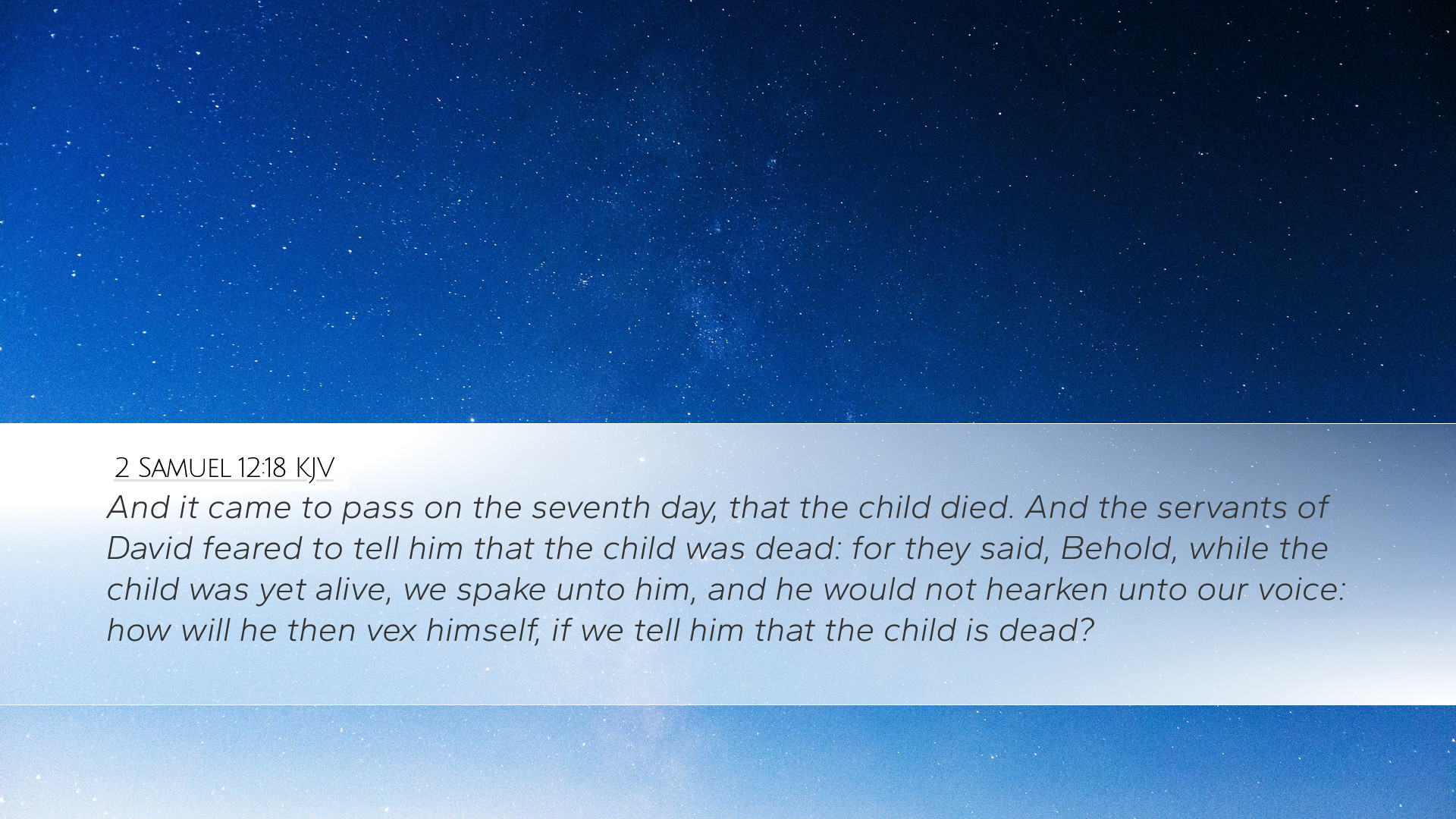Commentary on 2 Samuel 12:18
Verse Context: 2 Samuel 12:18 states, "On the seventh day, the child died." This verse concludes a somber narrative that follows the severe consequences of David's sin with Bathsheba, which included the death of their child as part of God's judgment through the prophet Nathan.
Introduction
The commentary surrounding 2 Samuel 12:18 reflects on themes of sin, judgment, repentance, and divine sovereignty. It serves as a poignant reminder of the repercussions of moral failings and the complex nature of God's grace. This verse encapsulates not only a particular historical event but also carries deep theological implications for understanding God's character and human suffering.
Commentary Insights
Matthew Henry's Perspective
Matthew Henry emphasizes the gravity of sin and the consequent suffering that befalls not only the sinner but also innocent parties. His analysis points out that David's sin significantly impacted the trajectory of his family and reign. He notes:
- David's deep distress during the child's illness showcases his emotional investment and recognition of his own actions.'
- Henry highlights the "seventh day" as a significant time frame, which may allude to a divine completion of God's decision regarding the child.
- He underscores the broader theological lesson: God's justice is sometimes inexplicable to human reasoning, yet it remains perfect and righteous.
Albert Barnes' Insights
Albert Barnes provides a detailed examination of the implications of the child's death within the narrative. He observes:
- Barnes correlates the child's death with the prophetic word given by Nathan, reinforcing God's judgment against David's sin.
- He discusses the societal implications of a king's sin, noting how personal conduct can influence public morale and divine favor.
- Additionally, Barnes addresses the theme of hope amidst calamity, encouraging readers to trust in God's broader plan, even when individuals cannot comprehend present suffering.
Adam Clarke's Commentary
Adam Clarke's analysis brings forth a pastoral approach, focusing on the emotional and spiritual dimensions of the event. He writes:
- Clarke reflects on David's anguish, acknowledging the natural human response to grief and anticipatory mourning.
- He emphasizes the importance of prayer and supplication during times of trial, as evidenced by David's actions prior to the child's death.
- Clarke also notes the hope for the eventual reunion in the afterlife, suggesting that God's mercy persists even in the most heartbreaking situations.
Theological Themes
Several theological themes emerge from 2 Samuel 12:18, worthy of deeper investigation:
- Judgment and Justice: The cross-reference to God's divine judgment serves as a reminder of the serious nature of sin, which cannot be overlooked in the divine economy.
- Repentance: The story illustrates the power of repentance; even amidst the consequences, David's acknowledgment of sin places him in a position of humility before God.
- Grace in Suffering: There exists a mysterious interplay between suffering and grace. While the child suffers as a consequence of sin, God's ultimate purpose transcends the immediate tragedy.
Practical Applications
For pastors, students, and theologians, several practical applications arise from this commentary:
- The seriousness of sin: This passage serves as a stark reminder of how personal failings can lead to catastrophic consequences, urging constant vigilance in maintaining holiness.
- Empathy in pastoral care: Understanding the depths of suffering faced by others can cultivate compassion and enhance one’s ministerial approach.
- The importance of prayer: David's commitment to praying for his child during illness illustrates the vital role of prayer in the lives of believers, especially during crises.
- Hope amidst despair: Encouraging congregants to hold onto hope during trials reflects a key pastoral responsibility, grounded in the belief of God's overarching plan.
Conclusion
2 Samuel 12:18 serves as a profound narrative on the interplay of sin, suffering, and divine justice. By drawing from the rich insights of esteemed commentators, this analysis aims to provide depth to the understanding of the text. As one contemplates the implications of this verse, it is essential to reflect upon God's character—how justice and mercy coexist, and how believers can navigate the complexities of their own spiritual journeys in light of God's truth.


